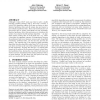Free Online Productivity Tools
i2Speak
i2Symbol
i2OCR
iTex2Img
iWeb2Print
iWeb2Shot
i2Type
iPdf2Split
iPdf2Merge
i2Bopomofo
i2Arabic
i2Style
i2Image
i2PDF
iLatex2Rtf
Sci2ools
113
click to vote
ACMSE
2010
ACM
2010
ACM
Adaptive stable marriage algorithms
Although it takes O(n2 ) worst-case time to solve a stable marriage problem instance with n men and n women, a trivial O(n) algorithm suffices if all men are known to have identical preference lists and all women also are known to have identical preference lists. Since real-world instances often involve men or women with similar but not necessarily identical preference lists, this motivates us to introduce the notion of an adaptive stable marriage algorithm -- an algorithm whose running time is of the form O(n + k), where k describes the aggregate amount of disagreement between the preference lists in our instance versus a pair of specified "consensus" preference lists, one for the men and one for women. The running time of an adaptive stable matching algorithm therefore gracefully scales from O(n2 ) in the worse case down to O(n) in the case where preference lists are all in close agreement. We show how the O(n+k) running time bound can be achieved if all women are known to...
ACMSE 2010 | Algorithm | Identical Preference Lists | Stable Marriage | Theoretical Computer Science |
Related Content
| Added | 10 Feb 2011 |
| Updated | 10 Feb 2011 |
| Type | Journal |
| Year | 2010 |
| Where | ACMSE |
| Authors | John Dabney, Brian C. Dean |
Comments (0)

